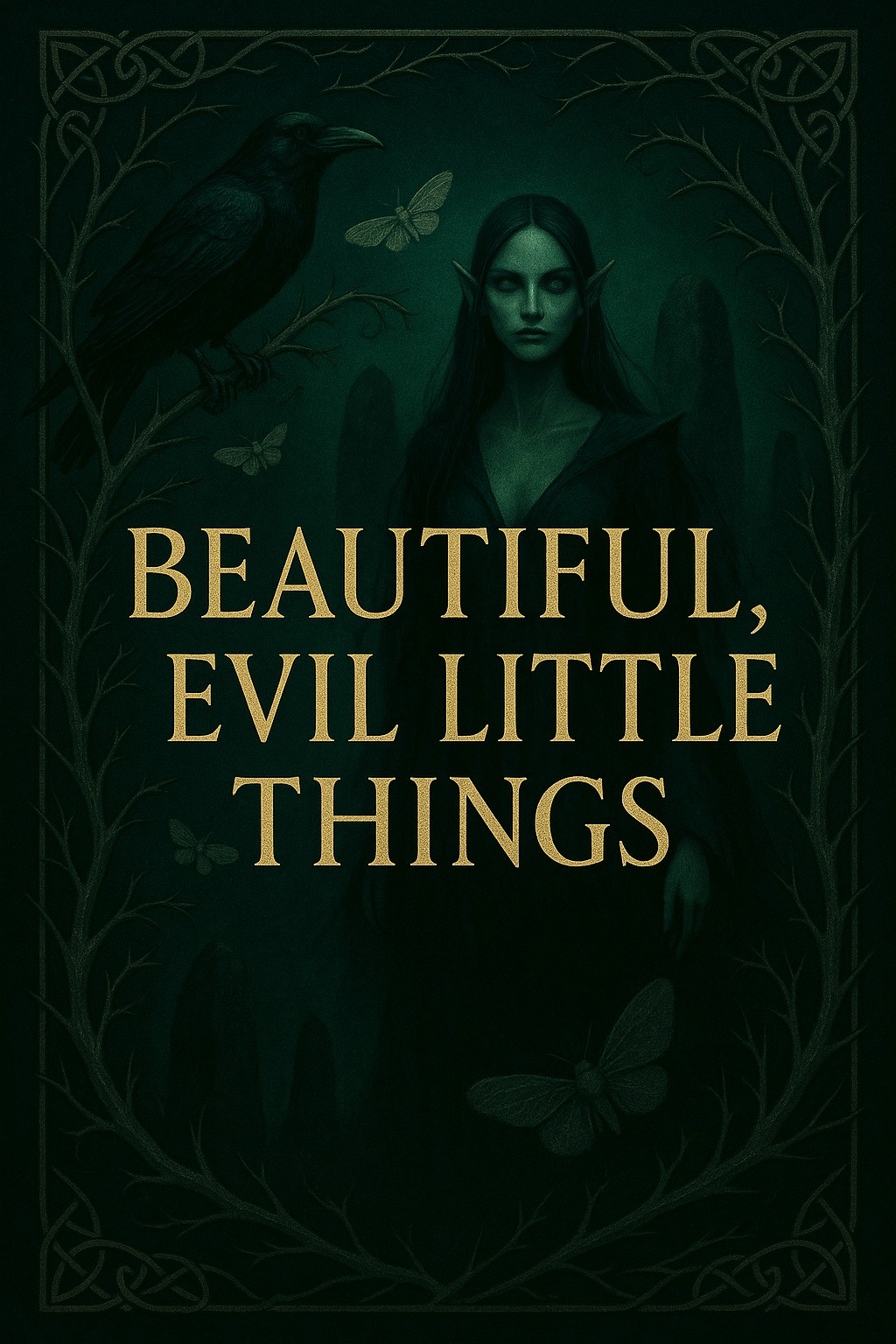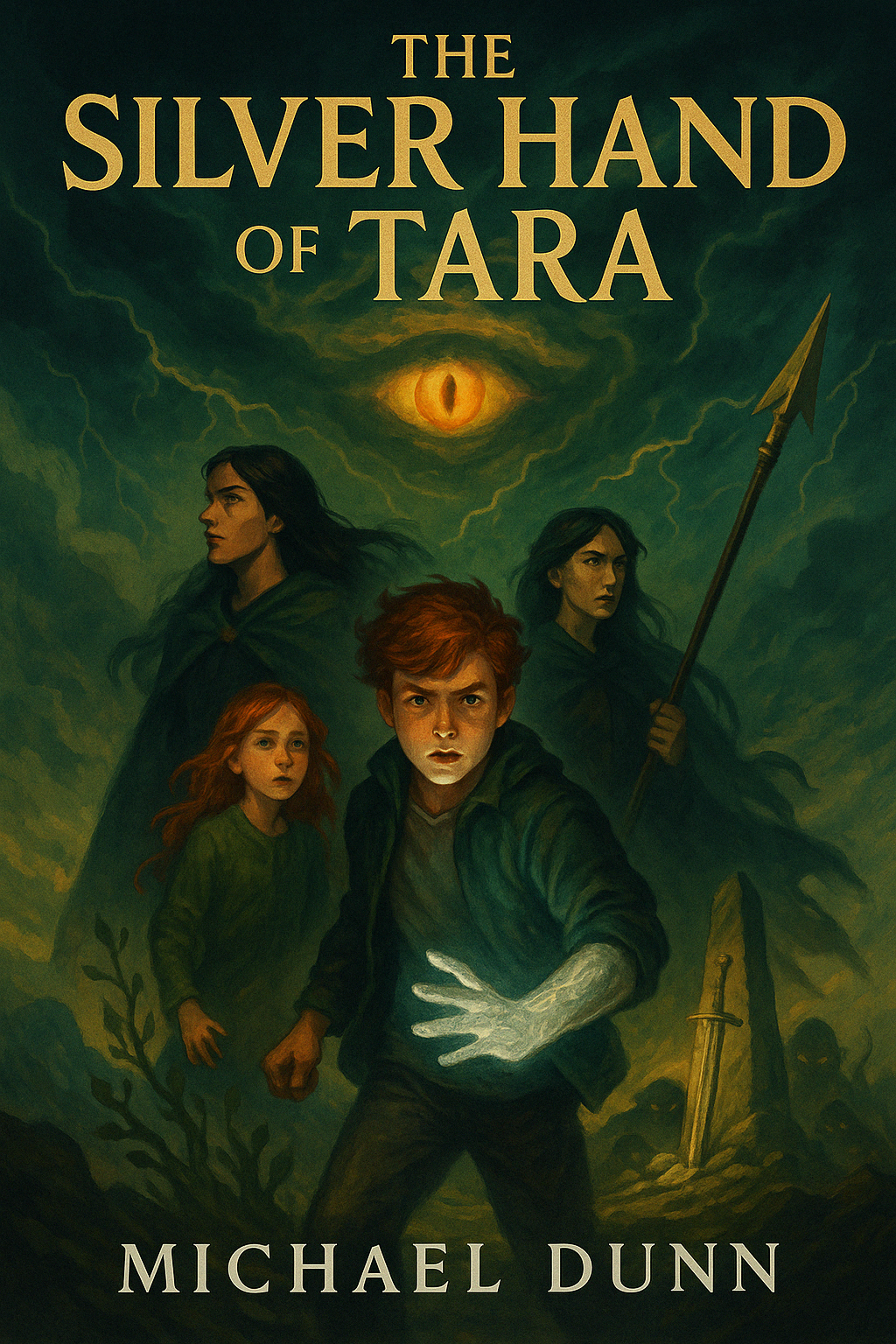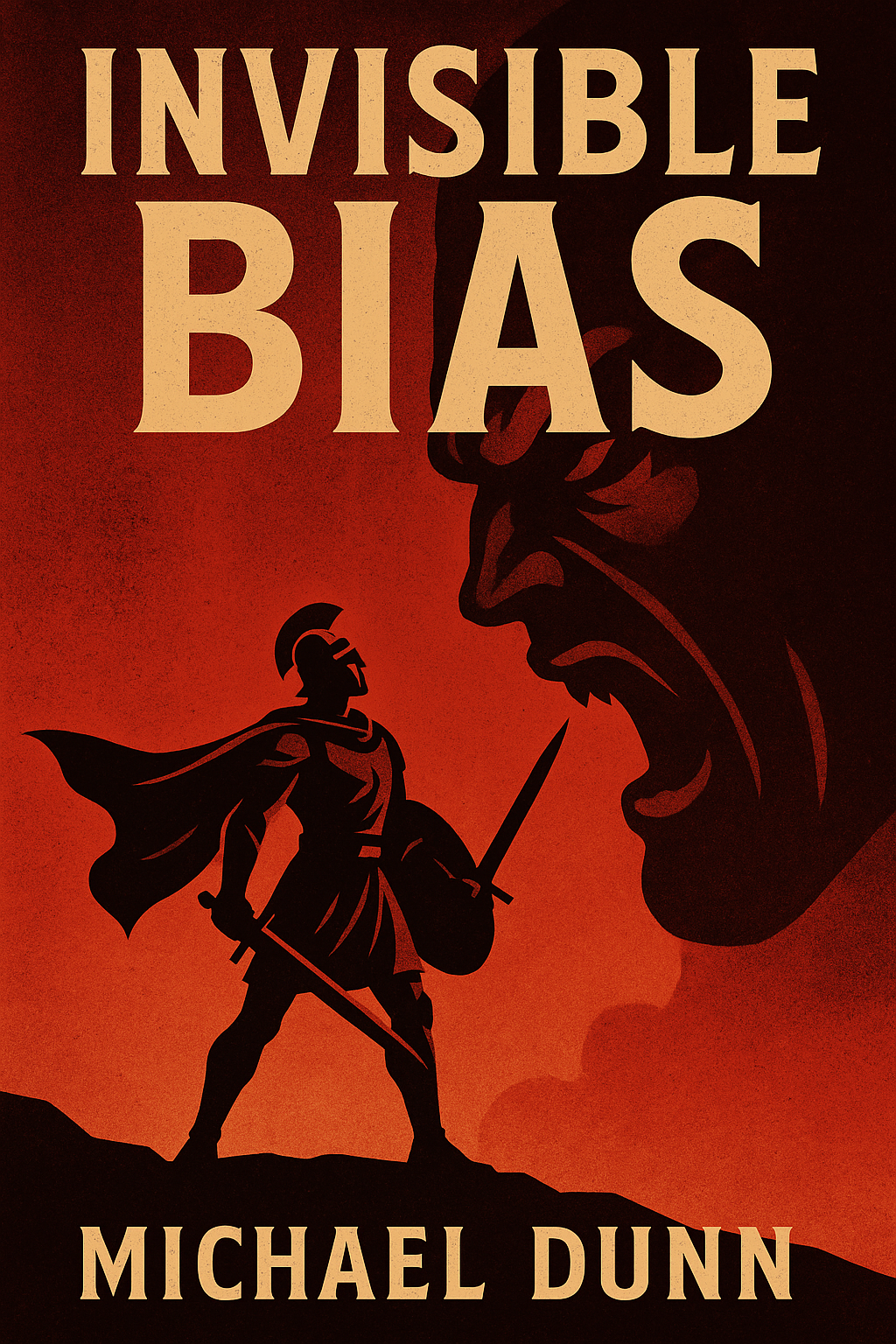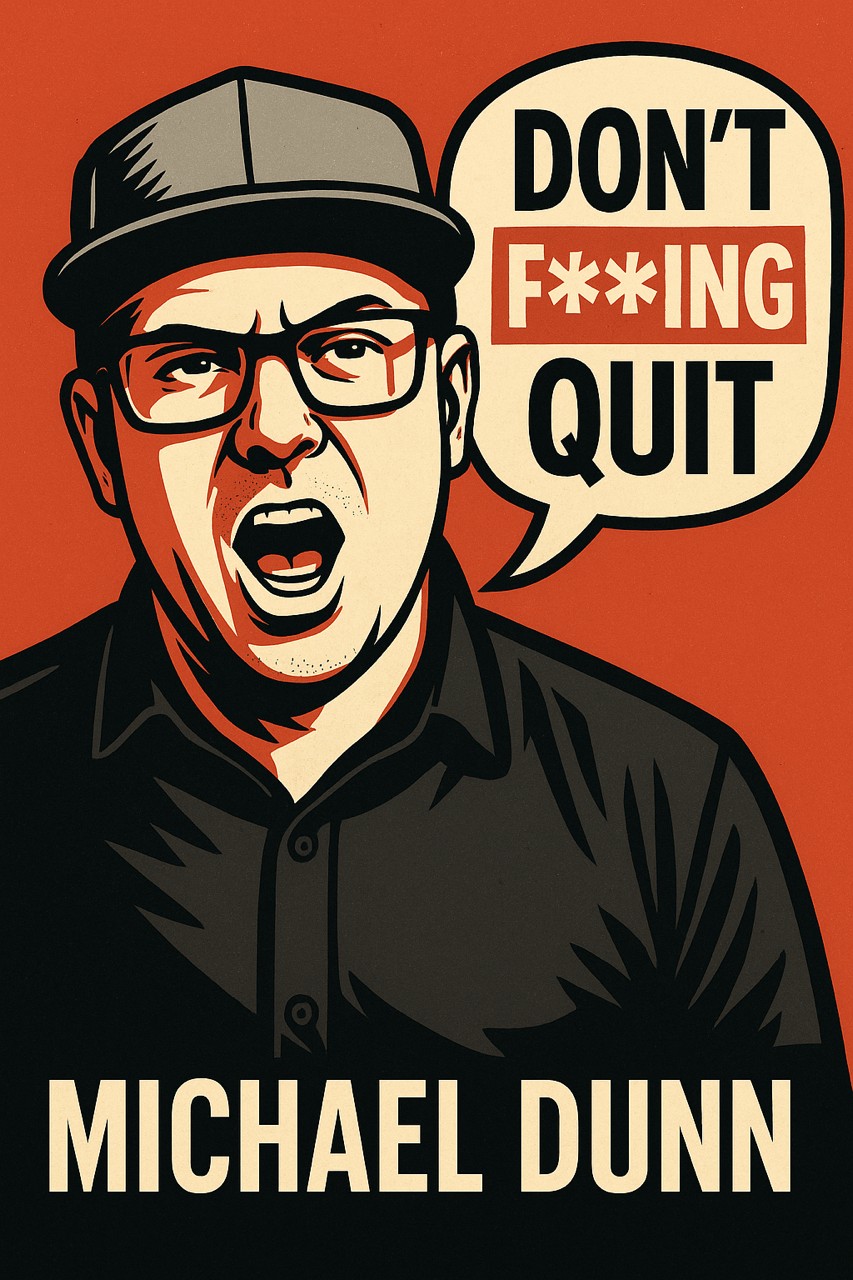Ink & Iron is more than a name, it's a stance. It's the refusal to quit, the belief that words can cut as sharp as steel, and the demand that stories carry weight, grit, and truth. This isn't a publishing house chasing trends or soft edges. It's a forge for fiction, folklore, field guides, and essays that don't flinch, that lead from the front, and that leave a mark. Ink is for the story. Iron is for the will behind it. Put together, it's a challenge, create, endure, and lead by example.
Explore the Silverhand Saga
Myth collides with modern life. Begin with The Silver Hand of Tara.
Fiction

Last of the Púca
The valley keeps its own ledger. Every ribbon tied to thorn, every coin left at a well, every silence held too long is counted. The old people call it courtesy, the young call it superstition, but Aoife knows the balance is real. When surveyors arrive with bright tape and maps that rename the land, when crates are moved in the dark and men laugh too quickly at old warnings, the ridge begins to stir. Drawn into its keeping, Aoife finds herself carrying more than her own voice. The braid at her throat tightens, the ledger hums in her chest, and the parish's debts press against her skin. Each truth she speaks costs memory, each silence weighs heavier than the last. To endure, she must learn the rules her grandmother whispered: salt for the ford, iron for the sill, truth for the tithe. But the ridge is not the only one counting. A shadow walks with the Crow, a Collector waits in Dublin, and hunger stretches its hand toward the parish. As Samhain nears, Aoife must decide how much of herself she can pay to keep the balance and whether one woman's steadiness is enough when the land itself demands a keeper. The Last of the Púca is a lyrical tale of folklore and endurance, where myth presses against modern law, and silence speaks louder than any bargain.

Beautiful Evil Little Things
Garda Seán Ó Murchú follows a string of vanishings that leave only a hush behind, witness accounts of a figure darker than shadow, and lights that dim for a breath before the world resumes. In Galway's galleries and along the quays, the investigation bends toward an old name whispered in folklore, a patron who gives brilliance and takes life, the Leannán Sí.
Out in the fields, a measured grid of stakes and mirrors at ringforts points to design, not trespass, while reports of the Slua Sí ride in on weather that does not feel like weather at all. As the case widens, Seán is pressed into a role with two masters, keeping the balance between State and the Aos Sí, and learning that silence can be evidence.
The Silverhand Saga

The Silver Hand of Tara
The Silver Hand of Tara launches the Silverhand Saga with a collision of myth and modern life. After a car crash, fifteen-year-old Finn O'Reilly wakes to find his missing arm replaced by living silver an ancient shard of Nuada's legendary sword. Haunted by prophecy and stalked by Fomorian sea-demons, Finn searches for his lost sister Orla while struggling to control a weapon that remembers more than he does. With the goddess Brigid as a reluctant mentor and Ireland itself cracking under old magic, Finn is forced into a war older than memory, where prophecy isn't destiny but debt and every choice he makes will decide whether Ireland survives or drowns.
Coloring Books

Birds of Ireland: A Colouring Field Guide
An all-ages colouring journey through Ireland's birdlife, from robins and goldfinches to storm petrels and choughs. Designed for calm focus, curiosity, and a little everyday wonder.
Leadership Series

Invisible Bias
Generational tensions and cultural microaggressions are often invisible, but their impact is not. This book explores how stereotypes, outdated assumptions, and unconscious behaviors erode collaboration and inclusion, and offers strategies to dismantle those hidden barriers.

Mentor Without a Title
Leadership is behavior, not a job description. Presence, consistency, and courage matter more than rank, this field guide equips professionals at any level to influence culture, set standards, and build trust across generations.

Old School Professionalism
Professionalism is not optional, it is the foundation of trust and performance. From clarity in communication to visible ownership and accountability, these standards rebuild credibility in teams and organizations.
"Old school Professionalism is not a Boomer playbook. It is a modern guide to driving efficiency, strengthening accountability, and streamlining communication so teams can optimize outputs and build trust faster." Kenneth Lanewood, 25-year Global IT Professional
Self Help

Leaving the US
This book is a practical and honest guide for those considering building a life outside the United States. It covers planning, relocation, cultural adjustment, and the legal realities of emigration. It is not a fantasy or an escape plan, but a roadmap that helps readers make informed decisions about one of the biggest moves of their lives.

Don't F***ing Quit
A blunt field manual for when motivation dies and the excuses get loud. Built around hard principles kill excuses, walk through pain, show up tired, choose discipline over dopamine this book teaches you to keep moving when every part of you wants to fold.

Help! My Computer Is Smarter Than Me
Help! My Computer Is Smarter Than Me is a survival guide for anyone who has ever felt outsmarted by their own devices. Written with humor and plain language, it demystifies the everyday frustrations of technology whether it's printers refusing to print, Wi-Fi dropping at the worst moment, or files disappearing into digital black holes. Instead of jargon and lectures, the book gives readers simple patterns, checklists, and "digital street smarts" they can rely on when panic strikes. From email headaches and password nightmares to smart gadgets and cloud storage, it shows you how to stay calm, fix problems, and keep your tech working for you. It's not about turning you into an engineer it's about giving you the instincts and confidence to survive the chaos. If you've ever wanted fewer meltdowns, less panic, and the sweet victory of making your devices behave, this is the book to buy.
Ink & Iron, Articles
Ambiguity Is a Joke, But the System's Laughing at Us
From Equifax's "sophisticated actors" to vague AI ethics theatre, leaders across tech and policy deploy strategic vagueness to dodge accountability. This essay exposes how ambiguity has become a deliberate shield used to mask failure and hoard power.
Read nowAI is making people dumber: The Good, the Bad, the Quietly Catastrophic
Generative AI promises instant answers but erodes the cognitive effort at the heart of learning. Drawing on psychological research and education data, this piece argues that outsourcing thinking to chatbots creates overconfidence, dependency, and intellectual fragility, and calls for a reevaluation of how we teach and work with AI.
Read nowIgnorance by Design: How U.S. Tech Policy Became a Political Punchline
From gag-order clauses hidden in infrastructure bills to vapid age-verification laws and contradictory drone regulation, U.S. lawmakers are crafting tech legislation for optics rather than oversight. This essay dissects the stunning techno-illiteracy and political theatre shaping AI, privacy, and data policy.
Read nowReturn to office: a power grab masquerading as policy
Mandating butts-in-seats isn't about collaboration, it's about control. With evidence from big tech layoffs and Irish housing data, this essay argues RTO is a cultural counterattack from executives clinging to relevance.
The New Gatekeepers
Big Tech once celebrated meritocracy, but AI-driven restructuring now locks out the average engineer. Layoffs, inflated credential requirements, role creep, and opaque metrics have created an industry built on exclusion.
Read nowIn tech, when things get tight, culture dies first
When pressure rose, companies prioritised stock performance, normalised burnout, rolled back remote work for control, and quietly cut DEI. Trust is the new currency—and nostalgia is expensive.
AWS Outage, October 2025
A clear examination of the recent AWS disruption in US East 1, what failed, what it interrupted, and the practical architectural lessons to apply before the next event.
Choosing the Right AI
GPT, Claude, Gemini, and LLaMA compared with strengths, daily uses, work applications, and sensible guidance for automation.
The Beginner's Guide to Using AI
How to use GPT, Claude, Gemini, and LLaMA with calm structure, real commands, and respect for privacy.
Ethical Writing with AI
Prevent hallucinations, use MEAL structure, avoid em dash crutches, clean spacing, and finish with a one hundred percent line edit.
Digital Agents and the Future of the Middle Class
A clear look at how automated work is changing careers, stability, and identity across the next sixty years.
Automations That Spare the Worker from Paper Cuts
Small frictions steal attention. This essay lays out steady, tactical loops for meetings, menus, budgets, documents, and schedules plus concrete examples and commands.
Leadership and Management: The Two Pillars of Work
Leadership inspires; management sustains. Both are vital, but only one builds belief. This essay explores how vision, courage, and conscience define real leadership while management preserves structure and steadiness. Together, they form the rhythm of progress.
The Indispensable Worker
Specialization, certifications, and digital fluency build a moat around your career. This essay lays out a practical path to compound credibility through high-value skills, proof of mastery, and experience that companies cannot afford to lose.
The Brutal Truth You Keep Ignoring
Layoffs aren't cruelty, they're calculation. This essay strips the sentimentality from corporate logic and shows how to build real security: specialise, invest in your network, and stop outsourcing your survival to your employer.
AWS re:Invent 2025: Agents, Silicon, and the End of Hype
re:Invent 2025 wasn't about promises, it was about posture. This field report walks through agentic AI, Nova models, custom silicon, and why the next decade of cloud belongs to teams that can ship with AI, not just talk about it.
What Customers Really Think of Automated Agents
Automation looks great on dashboards and terrible in the queue. This essay steps inside the customer's experience of chatbots, IVR, and "AI agents," and asks a simple question: whose time are you really saving?
The Economic Impossibility of Student Loan Payments: A 2026 Reality Check
As wage garnishment begins, millions face a harsh truth: the math doesn't work. Income minus essential expenses leaves no room for student loans.
The Meta Catalyst
When Meta finally admitted its metaverse bet had failed, its 11,000-person layoff did more than cut costs. It gave the whole industry permission to abandon the fiction of stable tech careers.
Salaries Without Futures
Median salaries in the US, Canada, the UK, and Ireland now sit inside housing and cost structures that make real saving extremely difficult for typical households, especially younger or single earners trying to buy a first home. By contrast, countries like France and Australia still offer somewhat better alignment between incomes, saving rates, and housing affordability, leaving more room for multi‑earner households to build reserves and avoid permanent precarity.
Operational Social Intelligence
In cloud and SRE work, technical depth gets you in the door. Operational social intelligence is what still belongs entirely to you in an industry that automates everything else.
Two Worlds, One Wiring
Psychology says you do not get a separate brain for love and for work. The same wiring that shapes your romantic relationships quietly scripts how you show up with colleagues, managers, and teams.
Are We Really Heading Toward World War III?
World War III is not a coin toss, and it is not "either tomorrow or never." The serious work on this uses numbers: how many wars are active, how many people are dying in them, how much money states are spending on weapons, and what nuclear forces look like. Then it asks whether that pattern resembles 1914 or 1939, or something different.
The Death of the Nuclear Family
The traditional one-paycheck household did not die because people stopped believing in it. It died because governments and markets quietly stripped a single wage of its power.
A New List of Grievances
The colonists did not revolt on vibes. They revolted with a numbered list. Today the United States can draft its own, using ownership records, court rulings, and budget math instead of pamphlets and rumors.
The Emperor's New Acronym
The same principles that won wars for centuries, now packaged with acronyms and sold back to us.
The Truth About Tariffs: Who Really Pays the Price
There's a fundamental misconception being pushed in American political discourse right now. When political leaders claim "you don't pay the tariffs," they're either deliberately misleading the public or demonstrating a profound misunderstanding of basic economics.
The Sacred Art of Ink: Understanding the Psychology and True Meaning Behind Tattoos
The moment the needle first pierces skin, something profound happens that transcends the mere application of pigment beneath the dermis. A journey into why tattoos make us feel so good and what they truly mean to those who wear them with intention.
Way passed a call to arms — Ink & Iron
The colonists listed their grievances. Modern Americans can too, using ownership data, trust surveys, court records, and fiscal math instead of muskets.
The Geometry of Deception: When Power Refuses the Straight Line
How governments and corporations use circular communication patterns to obscure truth, examining the mathematical principles of honest dialogue, the psychological mechanisms of institutional deception, and why the shortest distance between two points remains the only path to accountability.
The Communication Paradox: Why Silence Isn't Protection
Why reducing communication in engineering organizations creates the exact problems it claims to solve, examining the false protection of information restriction and the real costs of managerial abdication disguised as employee advocacy.
The Vanishing Line: When Consequences Leave the Room
A culture can survive hardship, but it cannot survive pretending standards are optional.
Why Large Corporations Say They Want Leaders, but Hire for Manageability
"Not a right fit", "We feel that..." I know. you have read it before, so check out the article
Ink & Iron Videos
These are simple real world videos. No production tricks. No polished messaging. Just work, life, Creating and Leading by Example.
Subscribe to our Youtube Channel: Ink & Iron
Ink & Iron — Creative Spaces
Everyone has their space, that helps them "Think" or clears their mind, whatever you prefer. We decided to share ours and hope you do the same!
Ink & Iron
How do you take your first "Sit" after work?
Ink & Iron
Clearing out the cobwebs, how about you?
Ink & Iron
What's your Motivation?
Ink & Iron
Don't Copy and Paste Your Life Away
Ink & Iron
Practice Makes Proficience
Ink & Iron
KPI Environments
Ink & Iron
2Cents on Certifications
Ink & Iron Music
Hand Crafted Swamp Rock
Listen on Suno:
Swamp Rock Playlist on SUNO
Spotify Artist Page:
Ink and Iron on Spotify
YouTube Playlist:
Ink and Iron on YouTube
Apple Music:
Ink and Iron on Apple Music
Custom Music Player
Experience the full Ink & Iron playlist in our custom-built player with controls, queue management, and seamless playback.
Launch Music PlayerAbout Ink & Iron Authors/Content Creators

Mike Dunn
Michael Dunn is an American born author living in Kenmare, Ireland. A father of five, technologist, and PhD researcher in generational impact, technology, and communication, he writes stories that crack open myth and weave it into modern life. His work has been featured in the Irish Examiner, and his nonfiction includes the book Exit Strategy , Old School Professionalism , Invisible Bias , Mentor Without a Title and Help! My Computer is Smarter than me!.
His fiction centers on the Silverhand Saga, where memory, family, prophecy, and choice collide with ancient debts.
Before full-time writing, Michael led global technology teams across insurance, government, logistics, and cloud infrastructure, grounding his essays and research in reliability, security, and culture.

Kenneth Lanewood
Kenneth Lanewood is a technology executive with over two decades of global IT leadership across biotech in San Diego, e-commerce in Seattle, complex infrastructures in the UK, and multi-site operations in Taiwan. He currently serves as Director of IT Operations Engineering at Coupang Taiwan, driving automation, resiliency, and large-scale transformation.
His expertise spans infrastructure, cybersecurity, end-user services, and compliance, with delivery under ITIL, SOX, and ISO 27001. He has cut resolution times, launched alpha pilots, and rolled out programs that saved millions while elevating organizational readiness.
Known for mentorship and team development, Kenneth builds high-performing groups and bridges executive vision with actionable roadmaps that scale across regions and cultures.
